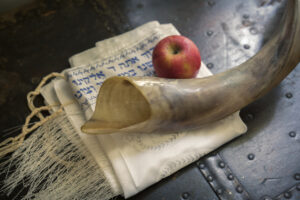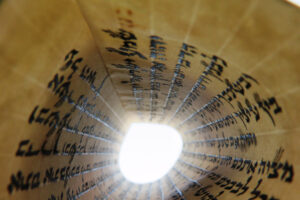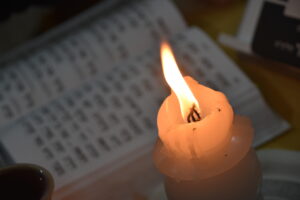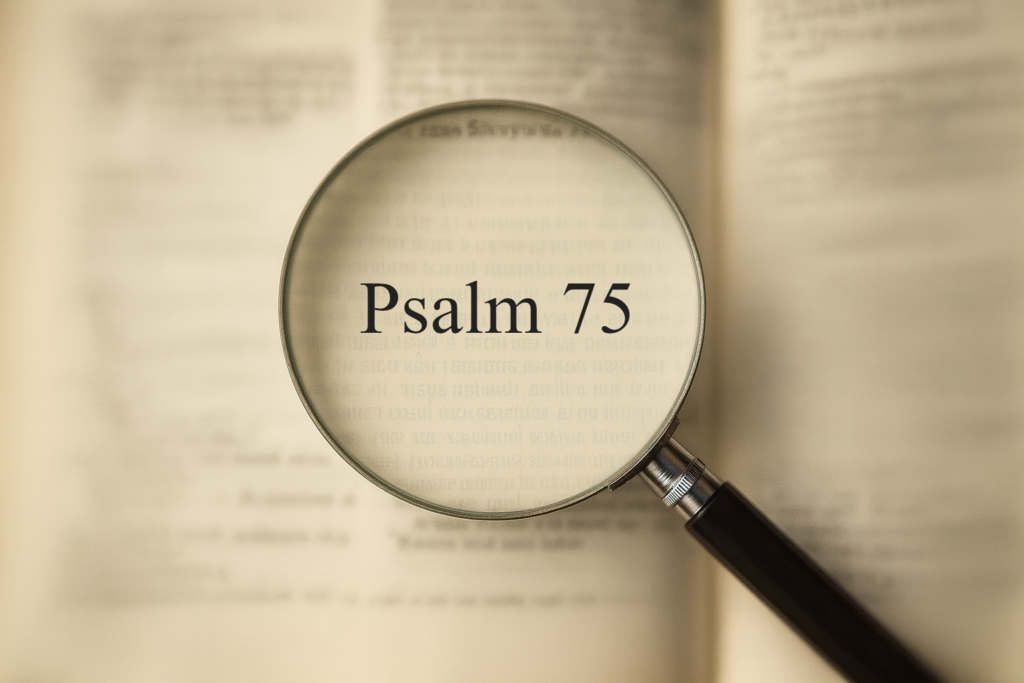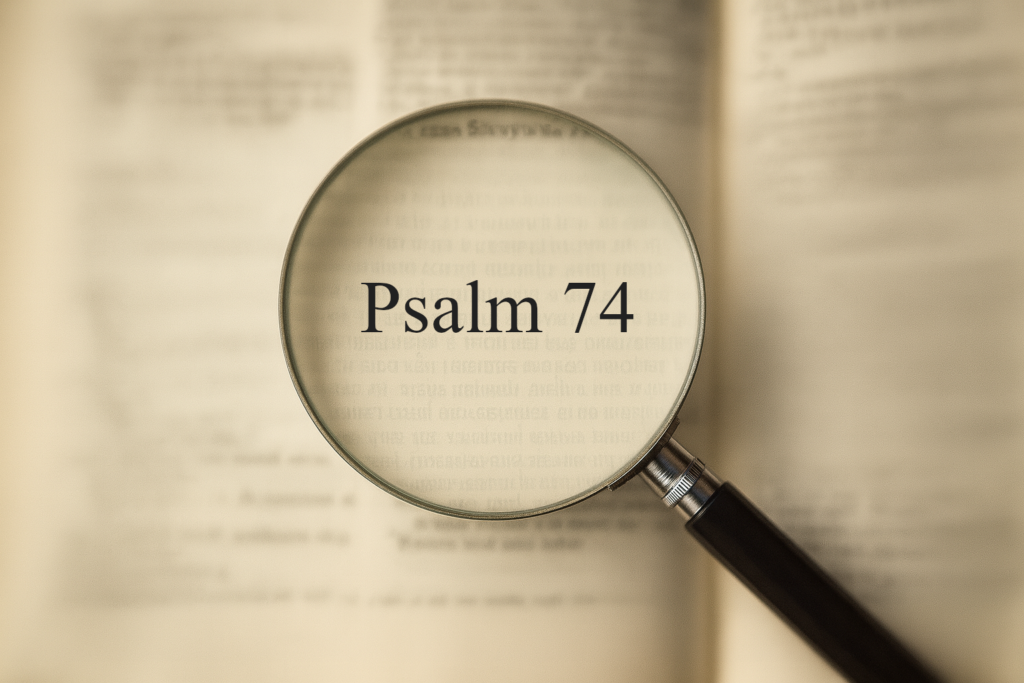FIVE YEARS WITH THE ZOHAR by Grant Luton
I don’t remember why I started the project. I think it was motivated by questions from my congregation concerning the Zohar. But I already had enough questions of my own to justify the project that would consume five years of my spare time. So I ordered two editions of the Zohar (totaling 27 volumes) and set out to read through the entire stack in order to see for myself what all the hubbub was about.
As I began the project, I felt a degree of trepidation fueled by warnings about all the occult mumbo jumbo I would find in the Zohar. But I also felt it my duty to protect my congregation should there be a legitimate need to warn them against this material. However, my respect for the many great rabbinic commentators who frequently cited the Zohar equipped me with the resolve to look into this material for myself. When the volumes arrived, I began my slow but deliberate reading while keeping a journal of my findings.
Before I go on to describe what I found in the Zohar, let me first tell you what I did not find in it. I did not find a single spell or incantation. Nor did I find instructions for making talismans, good-luck charms, red strings, holy water, or little hands with eyeballs in the palms. I found nothing in the Zohar that deserves the negative press that seems to surround it. I believe that much of the silliness that has arisen in pop culture (and some occult circles) under the misuse of the term Kaballah has been undeservedly attributed to the Zohar. After reading the complete Zohar for myself, the most critical thing I can say about it is that it can be mind-numbingly boring for long stretches. Very long stretches.
What I did find in the Zohar was a whirlwind of allegorical commentary on the Torah and Judaism, as well as parables and principles for living, all couched in imaginary conversations held by imaginary rabbis taking an imaginary journey. Much of what I read was extremely difficult to understand and seemed nearly meaningless … at least to me. This is due in part, I am sure, to my own deficiencies and also in part to the Zohar’s archaic style of language and its extensive use of a form of symbolism to which I was uninitiated. However, the rambling narrative of the Zohar was occasionally punctuated by strikingly beautiful passages and others very similar to teachings that I had thought were found only in the Apostolic scriptures. These are the passages that caught my attention and found their way into my journal. I discovered more than one hundred occasions where the Zohar directly explained a question I had concerning the New Testament. I am not saying that these are the correct or the only explanations, but their direct correlation to the Apostolic scriptures was undeniable. The more I read, the more obvious it became that the New Testament authors were familiar with the material contained in the Zohar. Or, and this is a distinct possibility, the authors of the Zohar were aware of the material contained in the New Testament.
Before taking a look at five sample passages from the Zohar, there are two points we must consider. First, we should not be surprised when the New Testament quotes source material outside the Tanach. This is not news to most of you. The New Testament writers frequently cite the Midrash Rabbah and other rabbinic and extra-biblical sources, such as when Jude cites a prophecy from The Book of Enoch.[1] Therefore it would not be unusual for some of the material in the Zohar to find its way into the New Testament scriptures.
Second, there is an ongoing debate over the age and authorship of the Zohar. Is it truly the product of the 1st-century rabbi Shimon bar Yochai as it claims to be? Or did the Jewish mystic Moshe de Leon author it in the 13th century? Or was it written in the Middle Ages by an author who had access to 1st-century material? Could it be a bit of all the above? I don’t know. But regardless of when the content of the Zohar was first committed to writing, it is certain that much of the material was already quite ancient and had been passed down orally. Again, the purpose of this article is simply to share with the reader the apparent connections between our Apostolic Scriptures and this oft-cited Jewish text. With that, let’s begin.
Example 1
Consider this question by Paul: Do you not know that we shall judge angels? How much more, matters of this life? [2]
Note that Paul assumes the reader would know that we humans will someday judge angels. But how could Paul assume this? Nothing in the Tanach informs us that we will someday judge angelic beings. However, the Zohar addresses the topic in this way:
When God thought of making man, He said: “Let us make man in our image, etc.” i.e. He intended to make him head over the celestial beings, who were to be his deputies, like Joseph over the governors of Egypt. The angels thereupon began to malign him and say, “What is man that Thou shouldst remember him, seeing that he will assuredly sin before Thee.” Said God to them, “If ye were on earth like him, ye would sin worse.” [3]
The passage proceeds to cite the sins, fall, and punishment of the Nephilim who left their exalted status to cohabit with human women as recorded in Genesis 6:1-4.
When we consider the deplorable moral conditions in the Corinthian community when Paul penned his epistle, we can see how this Zoharic commentary would parallel his thoughts and concerns. What an encouragement it would be to the Corinthian believers to know that they could succeed where a number of the angels themselves had failed! And if the believers in Corinth would maintain righteousness, they would someday stand as judges against the angels who had abandoned their loyalty to God.
Example 2
Another cryptic passage by Paul describes how he had experienced something so otherworldly that he describes himself in the third person as one who was denied permission to share the things he heard. The passage reads like this:
I know a man in Messiah who fourteen years ago – whether in the body I do not know, or out of the body I do not know, God knows – such a man was caught up to the third heaven. And I know how such a man – whether in the body or apart from the body I do not know, God knows – was caught up into Paradise and heard inexpressible words, which a man is not permitted to speak… And because of the surpassing greatness of the revelations, for this reason, to keep me from exalting myself, there was given me a thorn in the flesh, a messenger of Satan to buffet me – to keep me from exalting myself! [4]
What’s this about “the third heaven”? Where do we read of such a thing in the Tanach? Did Paul coin this expression himself based on his vision? Or did he derive it from the following information found in the Zohar?
And the firmaments are seven in number: Curtain, Firmament, Heavens, Abode, Residence, Dwelling, and Skies. Heavens (Shechakim) is so called because therein the millstones grind the mannah for the righteous for the future to come. And the basis of the name shechakim is the verse: “And you shall beat (shachakta) some of it very small’ (Shemot 30:36). [5]
This passage begins by naming the seven firmaments (or levels of heaven), giving special attention to the third level called “Heavens” (or shechakim in Aramaic, the language of the Zohar). Now note what takes place in this third level of Heaven. It is the place where “the millstones grind the manna for the righteous for the future to come.” What an odd and lovely image that manna – the heavenly bread – is produced by heavenly millstones in this third level of Heaven. Manna in the Scriptures is always a symbol for God’s Word, and it is in this level of Heaven, in which manna is produced, Paul says he “heard inexpressible words, which a man is not permitted to speak”.
And why is he not permitted to speak them? According to the Zohar, this manna is “for the righteous for the future to come.”
Regarding Paul’s lacking permission to speak the lofty words that he heard, the Zohar records a similar experience by another rabbi:
One day Rabbi Yosi was ill. Rabbi Aba and Rabbi Yehuda visited him. They saw him prostrated on his face, sleeping. When he awoke, they saw his face smiling. Rabbi Aba said to him, You have seen something new. He said to them, Indeed, for my soul rose and saw the glory of those who suffered martyrdom for the sanctity of their Master going into thirteen rivers of pure balsam and the Holy One, blessed be He, taking delight in them. I saw what I was given no permission to relate. I asked them saying, Whose glory is this, and they told me it is that of those who loved their Master in that world. From what my soul has seen, my heart is illuminated. Hence my face is smiling. [6]
Example 3
Let’s look next at a passage from Matthew’s gospel:
At that time the disciples came to Yeshua, saying, “Who then is greatest in the kingdom of heaven?” And He called a child to Himself and set him before them, and said, “Truly I say to you, unless you are converted and become like children, you shall not enter the kingdom of heaven. “Whoever then humbles himself as this child, he is the greatest in the kingdom of heaven. And whoever receives one such child in My name receives Me; but whoever causes one of these little ones who believe in Me to stumble, it is better for him that a heavy millstone be hung around his neck, and that he be drowned in the depth of the sea.” [7]
Have you ever wondered why the Master used such graphic language to describe the just sentence of one who causes a child to stumble? Could He not as easily have said that the offender should be drowned? Or simply be put to death? It is possible that Yeshua had in mind an image also found in the Zohar – an image that would even more powerfully demonstrate the seriousness of stumbling a child. Consider this quote from the Zohar:
Come and see: When the day is sanctified on the evening of Shabbat, a tabernacle of peace descends and settles on the world. What is this tabernacle of peace? It is the Shabbat. On Shabbat, all the evil spirits, stormy spirits, demons, and the defiled hide behind the millstone of the chasm of the great abyss. [8]
If indeed Yeshua had this concept in mind, it certainly adds a powerful dimension to His statement. In essence, He was saying that one who causes a young child to stumble is in league with the demonic forces and “the defiled” and deserves to share their fate, including losing their share in the Sabbath.
How did these millstones wind up at the bottom of the sea or “great abyss”? In light of the previous mention of millstones in the Zohar, it appears that just as some angels had fallen from their lofty position as servants of God, some of the millstones created to produce manna for God’s people had been lost with them. Therefore one who stumbles a little child is no different than the angelic beings who left their position in heaven and now dwell in the abyss. What an image!
Example 4
A great deal of mystery surrounds the identity of Melchizedek, who makes a brief cameo appearance in the Torah and then disappears from the narrative. He meets Abraham after his victory at the battle of the kings. Here is the entire passage:
And Melchizedek king of Salem brought out bread and wine; now he was a priest of God Most High. And he blessed him and said, “Blessed be Abram of God Most High, Possessor of heaven and earth; and blessed be God Most High, Who has delivered your enemies into your hand.” And he gave him a tenth of all. [9]
All we know about Melchizedek is contained in these three verses. However, David makes an equally cryptic mention of Melchizedek in one of his psalms:
The LORD has sworn and will not change His mind, “Thou art a priest forever according to the order of Melchizedek.” [10]
The author of Hebrews also refers to this mysterious figure and compares him to Messiah, hinting that they might even be the same person. Here is the passage in Hebrews:
For this Melchizedek, king of Salem, priest of the Most High God, who met Abraham as he was returning from the slaughter of the kings and blessed him, to whom also Abraham apportioned a tenth part of all the spoils, was first of all, by the translation of his name, “king of righteousness”, and then also “king of Salem”, which is “king of peace.” Without father, without mother, without genealogy, having neither beginning of days nor end of life, but made like the Son of God, he abides a priest perpetually. Now observe how great this man was to whom Abraham, the patriarch, gave a tenth of the choicest spoils. And those indeed of the sons of Levi who receive the priest’s office have commandment in the Torah to collect a tenth from the people, that is, from their brethren, although these are descended from Abraham. But the one whose genealogy is not traced from them collected a tenth from Abraham, and blessed the one who had the promises. But without any dispute the lesser is blessed by the greater. And in this case mortal men receive tithes, but in that case one receives them, of whom it is witnessed that he lives on. And, so to speak, through Abraham even Levi, who received tithes, paid tithes, for he was still in the loins of his father when Melchizedek met him. [11]
Could the author’s insights have been guided by information found in the Zohar? Consider the following:
This is alluded to in the words “Melchizedek (lit. king of righteousness) king of Salem” (lit. completeness), i.e. the king who rules with complete sovereignty. When is he completely king? On the Day of Atonement, when all faces are illumined. According to another explanation, “Melchizedek” alludes to the lower world, and “king of Salem” to the upper world; and the verse indicates that both are intertwined inseparably, two worlds like one, so that the lower world also is the whole, and the whole is one. [12]
Hence in the days of Abram MELCHIZEDEK KING OF SALEM (“salem” = completeness), i.e., God whose throne was then established in its place and whose sovereignty, therefore, became complete, BROUGHT OUT BREAD AND WINE, i.e., produced the appropriate food for the whole world, and did not withhold blessing from all the world; from the upper grades, he brought forth food and blessings for all the worlds. AND HE WAS A PRIEST TO THE MOST HIGH GOD, the whole thus being in the most perfect order; to show that as the wicked upset the world and cause blessing to be withheld, so the righteous bring blessing to the world and for their sakes all its inhabitants are blessed. AND HE GAVE HIM A TENTH OF ALL, to wit, of those blessings which issue from “all”, the source of all the blessings which descend upon the world. According to another explanation, God gave Abram a tenth… [13]
The main point I wish to emphasize in quoting these two passages is the fact that the Zohar, like the book of Hebrews, equates Melchizedek with the Divine. But the Zohar also states that in Melchizedek, both the divine and the physical are “intertwined inseparably.” Though these quotes from the Zohar may not bring final clarity concerning the identity of Melchizedek, they do help us to appreciate the great mystery and intrigue that surrounds this individual in Jewish lore and why the author of Hebrews was inspired to use him as an illustration of the Messiah.
Example 5
As believers in Messiah, the prophecy found in Isaiah 53 is particularly meaningful to us. It describes in sublime language the rejection, suffering, and sacrifice of our humble and loving Savior:
He was despised and forsaken of men, a man of sorrows, and acquainted with grief; and like one from whom men hide their face, He was despised, and we did not esteem Him. Surely our griefs He Himself bore, and our sorrows He carried; yet we ourselves esteemed Him stricken, smitten of God, and afflicted. But He was pierced through for our transgressions, He was crushed for our iniquities; the chastening for our well-being fell upon Him, and by His scourging we are healed. All of us like sheep have gone astray, each of us has turned to his own way; but the LORD has caused the iniquity of us all to fall on Him. [14]
As obvious as it may be to us that this prophecy describes Messiah’s sufferings, traditional Judaism has rejected this interpretation of Isaiah 53. Rabbinic Judaism holds that this prophecy is a description of the Jewish people historically in their suffering at the hands of the nations. The Zohar, however, combines both of these interpretations as follows:
When the Messiah hears of the great suffering of Israel in their dispersion, and of the wicked amongst them who seek not to know their Master, he weeps aloud on account of those wicked amongst them, as it is written: “But he was wounded because of our transgression, he was crushed because of our iniquities.” The souls then return to their place. The Messiah, on his part, enters a certain Hall in the Garden of Eden, called the Hall of the Afflicted. There he calls for all the diseases and pains and sufferings of Israel, bidding them settle on himself, which they do. And were it not that he thus eases the burden from Israel, taking it on himself, no one could endure the sufferings meted out to Israel in expiation on account of their neglect of the Torah. So Scripture says; “Surely our diseases he did bear”, etc. [15]
Though this passage contains some elements that may appear odd to us, it unabashedly asserts that the suffering described in Isaiah 53 applies directly to the Messiah.
Conclusion
I hope these five samplings from the Zohar provide a taste of this mystical material. Though I have picked just five examples at random in order to demonstrate the connection between the world of the Zohar and the world of the New Testament, space does not permit me to share any of the Zohar’s insightful parables and instruction in wisdom.
But is the study of the Zohar necessary for understanding and applying the Scriptures to our lives? No. Does it provide some interesting connections to certain New Testament passages? I definitely think so. Is the Zohar dangerous? No more than any other of the ancient writings, should we give them undue attention. Like the Talmud, the Zohar is a vast, rambling dialog on an array of issues. But whereas the Talmud concerns itself primarily with the rabbinic technicalities of Torah observance, the Zohar delves into the spiritual underpinnings of reality using allegory and nothing but allegory. Anyone who picks up a volume of Zohar will soon discover that there is no monster under the bed. Both bodies of work contain beautiful islands of wisdom amidst a sea of mundane dialog, and both works provide a window into the inner world of the Jewish soul. Because of this, both works will continue to be valuable to the Bible student and those who would grasp the spiritual perspective of the people through whom God gave His Word to the world.
NOTES:
[1] Jude 1:14. Additionally, Paul goes so far as to quote a Greek poet (Acts 17:28) and a philosopher from Crete named Epimenides (Titus 1:14).
[2] 1 Corinthians 6:3
[3] The Zohar, Soncino Press (vol.1, p.99) Emphasis mine. The Yeshivat Kol Yehudah edition of the Zohar uses stronger language, saying that God created man to be a “leader” over the angels and that he might “govern” the angels and that they would be “under his rule.”
[4] 2 Corinthians 12:2-4, 7
[5] The Zohar, Yeshivat Kol Yehudah (vol.20, p.370)
[6] Ibid. (vol.22, p.87) Emphasis mine.
[7] Matthew 18:1-6 Emphasis mine.
[8] The Zohar, Yeshivat Kol Yehudah, (vol.2, p.145). Elsewhere these millstones are referred to in the plural.
[9] Genesis 14:18-20 10 Psalms 110:4
[10] Psalms 110:4
[11] Hebrews 7:1-10 Emphasis mine.
[12] The Zohar, Soncino Press (vol.1, p.290)
[13] The Zohar, Soncino Press (vol.1, p.292)
[14] Isaiah 53:3-6
[15] The Zohar, Soncino Press (vol.4, pp.220-221)


